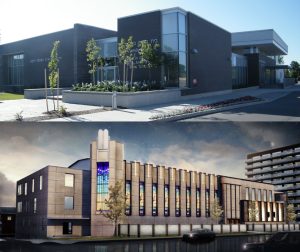 TORONTO — Toronto-area Conservative shuls are expanding the educational options they offer to high school students.
TORONTO — Toronto-area Conservative shuls are expanding the educational options they offer to high school students.
Cantor Eli Kirshblum
For the past dozen years, Adath Israel Congregation has offered a supplementary Jewish studies program for teens.
But this fall, its principal, Cantor Eli Kirshblum, has enlisted clergy from seven local synagogues to serve as faculty for the program and a new sister location at Beth Tzedec Congregation. At one time, Beth Tzedec had the largest such program among Conservative shuls, but it hasn’t offered one for a number of years.
Kirshblum, Adath Israel’s cantor emeritus, is the educational director of the reconfigured, two-branch school, which will be known as Congregational High School.
The school, which launches Oct. 4 with a combined barbecue and orientation, is under the aegis of the Canadian Council of Conservative Synagogues (CCCS). CCCS and UJA Federation of Greater Toronto are funding the program, and the tuition of $395 includes course materials and supper.
There’s no Jewish education prerequisite, although some students in the past have had a day school background, Kirshblum said. Others have attended supplementary school or have not had a formal Jewish education, he added.
The CCCS was formed in 2008 shortly after Adath Israel, Beth Emeth Bais Yehuda Synagogue and Beth Tzedec left the United Synagogue of Conservative Judaism, the umbrella body for Conservative congregations in North America. Beth Sholom Synagogue, which was previously unaffiliated, has been part of the CCCS since its inception.
Of the other congregations that are involved with the school, Beth David B’nai Israel Beth Am Congregation and Beth Tikvah Synagogue remain affiliated with the United Synagogue and have not joined the CCCS. Beth Torah Congregation, previously unaffiliated, is also a CCCS member.
Kirshblum, who chairs the CCCS’ education committee, said that Beth Tzedec, now the south branch of the Congregational High School, will serve Beth Sholom and Beth Torah, as well as its own congregation, while Adath Israel, the central branch, will also serve Beth David, Beth Emeth and Beth Tikvah.
Non-members are also welcome at the school, Kirshblum added.
Classes will run on Mondays from 5 p.m. to 7 p.m., with an optional third hour if students want to take Hebrew for a high school credit.
Core classes will focus on contemporary issues such as biomedical ethics, Israel, God and faith, parent-child relationships, and current events “We can deal with topics they never have, as well as dealing with their world from a Jewish perspective,” Kirshblum said.
There is no homework, and no marks are given out. Students who have attended at least 75 per cent of classes for the first two years receive a $1,500 grant toward an Israel program (or $2,000 after three years with the same attendance record).
Kirshblum said the school aims to challenge its students and “make their Judaism come alive for them, so they can get a sense of what the Jewish approach is on certain important topics.”






